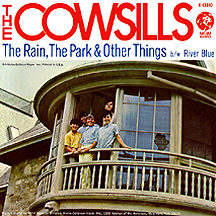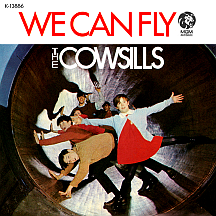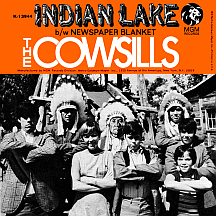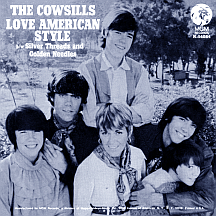THE COWSILLS
In 1965, Rhode Island-born, guitar-playing brothers Bill and Bob Cowsill were 17 and 16 years old, inspired by the harmonies of The Everly Brothers and mesmerized like so many others by the brilliant success of The Beatles. They'd already been singing together awhile in Newport, their island-bound hometown, when the preference for rock and roll took over. Destined to remain a duo only a short time, younger members of their large family were gradually added to the act. Soon Barry (the eleven-year-old bassist) and John (the nine-year-old drummer), the fifth and sixth oldest of the musically-inclined siblings, made the band a quartet, a configuration that lasted about two years until darn near the whole family got involved. The Cowsills became successful with that more-the-merrier approach, at least as far as their public image and record sales were concerned. Life at home, on the other hand, wasn't so harmonious.
That first quartet of Cowsill musicians (and singers - and songwriters) were booked all around the Newport area (including many dates at the historic Muenchinger-King Hotel) and despite their ages there were even some over-21 nightclub gigs. They had a record released in late '65 on Joda, a label co-owned by singer Johnny Nash; Bill and Bob's "All I Really Wanta Be is Me" fit right in with the folk-rocking garage band trend of the time, offering no hint as to which way their musical preference would lean in the future. An appearance in September on NBC's Today Show (one of its producers had seen them perform in R.I.) was a major coup but didn't help them get a second Joda release.
In 1966 the group was signed by Mercury Records and placed on the company's Philips label to figuratively rub shoulders with stars like The 4 Seasons, Dusty Springfield and Nina Simone. "Most of All," a mawkish teen pop tune composed by Gary Geld and Peter Udell, wound up on station playlists around the country and spent a few weeks mid-summer as a Billboard "Bubbler," prompting a follow-up, "Party Girl" (a minor chart single two years previous for Tommy Roe), that producer Shelby Singleton felt had stronger potential, an incorrect assessment.
After the failure of a third Philips single, a cover of Simon and Garfunkel's "A Most Peculiar Man," they were off the label. Almost immediately, Barbara Cowsill (strangely, they called her "Mini-Mom"), who'd occasionally sung in public with the two oldest brothers, joined her sons in an audition for songwriter Artie Kornfeld (eight-year-old little sis Susan was also there and sang along); Kornfeld recommended them to Mort Nasatir, president of MGM Records in New York. In August 1967, the group (four boys and suddenly-new-member Barbara) recorded "The Rain, the Park and Other Things" (better remembered, perhaps, for its refrain: 'I love the flower girl...'), a late-entry "Summer of Love" song written by Kornfeld and Steve Duboff. The single, with its well-structured vocal arrangement, rain effects and sun-breaking-through-the-clouds imagery, started strong; as it shot up the charts in November, the entire family of nine (yes, there are other siblings yet to be mentioned!) kissed Newport, Rhode Island goodbye and moved to New York City.
By December the single had exceeded all expectations, reaching number two on the Billboard charts and number one on Cash Box. William "Bud" Cowsill, a Navy man and overbearing father, had been calling the shots all along (though you could call it "ruling with an iron fist"); one story concerns Bob's twin, Richard "Dick" Cowsill, who was nixed by his booze-guzzling dad after a brief audition, branded as "no-talent" and barred from being in the act. During the group's late-'60s hitmaking phase, Dick was serving in Vietnam. Claims of physical and mental abuse have been made by the kids themselves (but not until much, much later). No one outside the immediate family circle had a clue. The teenage and adolescent Cowsills spent their formative years focusing on making music and money, the latter a benefit that barely seemed to materialize.
At any rate, expansion was completed when Paul Cowsill (16 by this time) and "Little Susie" were added to the act, numbering seven at its most crowded. Bill and Bob's rock duo had transformed into something they hadn't foreseen! Still, the gold record for "The Rain, the Park and Other Things" gave them a green light to create a pastiche of clever pop songs, though under the supervision of various producers and record company honchos. Media pigeonholing into the "bubblegum" category was shortsighted, as arrangements were always quite inventive; no two Cowsills singles sounded alike. "We Can Fly," a big, brassy production number written by Kornfeld and Duboff with input from Bill and Bob, had a strong top 40 run in early 1968, leading off a very busy year.
"In Need of a Friend," an original song, preceded another top ten hit, "Indian Lake" ('...a scene you should make with your little one!'), penned by upstate New Yorker Tony Romeo, who was mainly known for contributing material some months earlier to little-known folk act Good and Plenty. During the summer of '68 the family was seen in magazine ads and TV commercials for the American Dairy Association (singing 'Wake Up...to a milk day!') and had a one-shot comic book (Harvey Pop Comics #1), its cover depicting cartoon versions of Susan and four of the boys "We Can Fly"-ing through space, with typical comic adventures inside and a pin-up page for each group member.
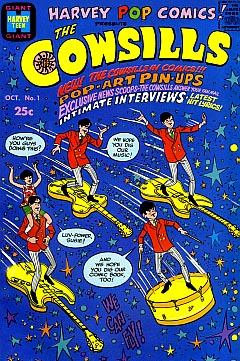
In September the family moved out west and bought a home in Santa Monica (easy access to Hollywood). In November they starred in a variety special for NBC, A Family Thing, hosted (and narrated) by singing, dancing Beverly Hillbillies patriarch Buddy Ebsen ("another buddy," father Bud, was on the show and appeared uncomfortable on-camera). The gang performed all their hits to that point, in addition to many parent-friendly standards and Broadway-style songs and dance routines. Meanwhile, other Tony Romeo tunes hit the airwaves: one of their strongest efforts, "Poor Baby," landed mid-chart, and "The Path of Love" was credited to John Cowsill (the drumming 12-year-old's voice still very high).
The septet veered off the expected track in 1969 with their most notorious hit: James Rado, Gerome Ragni and Galt MacDermot's title tune from the Broadway musical "Hair," with tongue-twisting lyrics ('...shinin', gleamin', streamin' flaxen waxen...'), unthinkable ideas ('...a home for the fleas, a hive for the buzzin' bees...') and an end goal one or two people I've known have aimed for ('Don't never have to cut it, 'cause it stopped by itself!'). Subversively appropriate for the hippie stage extravaganza, it came off even better with the Cowsills' complicated vocal arrangement (dozens of takes were required in the studio) that added subtle nuance to the original soundtrack version. It amounted to a "trip" back to the top of the charts for the Cowsill clan that spring; as with the "Rain" single, they reached number two on Billboard and number one on Cash Box. Just as the song was dominating radio play, second oldest brother Bob appeared on an episode of The Dating Game (as bachelor number two) but didn't get the date with the desired bachelorette.
The bubble burst after "Hair," brought on in part by Bud's firing of eldest brother Bill (who tended to be more outspoken than the others), in effect weakening the structure of the family act. The remaining six stayed busy making appearances throughout the 50 states; they recorded the Arnold Margolin-Charles Fox theme for the comedy series "Love American Style" (a semi-star-studded weekly offering of two or three separate stories), which premiered on ABC-TV in the fall of '69. At about the same time, television producers Bernard Slade and Bob Claver met with them about developing a Cowsills sitcom but decided the siblings, who by that time were older than they preferred, lacked the acting experience to pull it off. So they came up with The Partridge Family instead, casting Oscar winner Shirley Jones (her hairstyle and overall look purposely similar to Barbara's) and her stepson, David Cassidy (the act's lead singer), along with Susan Dey, Danny Bonaduce and Laugh-In funnyman Dave Madden playing the role of their long-suffering manager.
So if you've ever thought your eyes were playing tricks on you, seeing two very similar alternate-universe music acts with a blonde pixie-cut mother and a bunch of kids...relax! It's just the Cowsills and their clones! Tony Romeo was involved with both incarnations, composing "I Think I Love You," the first Partridge Family single, a number one hit in the fall of 1970, just weeks after the series began its five-season run on ABC. The Cowsills, meanwhile, were coming apart at the seams. By 1971 only Bob, Paul, John and Susan remained. They were signed by London Records, their best-known song from this period a more rocking pop track than usual, "On My Side." In 1975 the Cowsill family filed for bankruptcy, citing debt of more than 400 thousand dollars. The band itself had settled into a core four that stayed together for decades (with occasional solo projects, such as Susan's recordings for Warner Bros. in 1976 including a remake of Carole King's 1962 hit "It Might as Well Rain Until September").
You could say the Cowsill clan was blessed...and cursed. Emphysema took Barbara's life at age 56 (in 1985) and Bud passed away several years later. Barry, Bill and "silent" brother Richard all died too young. The four surviving family members, on the other hand, have continued to illustrate how talented they really are. John has toured as drummer for The Beach Boys and is married to Vicki Peterson of 1980s girl band The Bangles, who sometimes makes records with Susan, who frequently performs in concert under the Cowsills name with brothers Bob and Paul (and, occasionally, John). For a time it seemed the pear-tree imitators had overshadowed the bovine originals, but The Cowsills remain accessible to fans old and new.
NOTABLE SINGLES:
- All I Really Wanta Be is Me - 1965
- Most of All - 1966
- Party Girl - 1966
- A Most Peculiar Man - 1967
- The Rain, the Park and Other Things - 1967
- We Can Fly - 1968
- In Need of a Friend - 1968
- Indian Lake - 1968
- Poor Baby - 1968
- The Path of Love - 1968
by John Cowsill - The Candy Kid (From the Mission on the Bowery) - 1968
- Hair - 1969
- The Prophecy of Daniel and John the Divine - 1969
- Love American Style /
Silver Threads and Golden Needles - 1969 - On My Side - 1971


